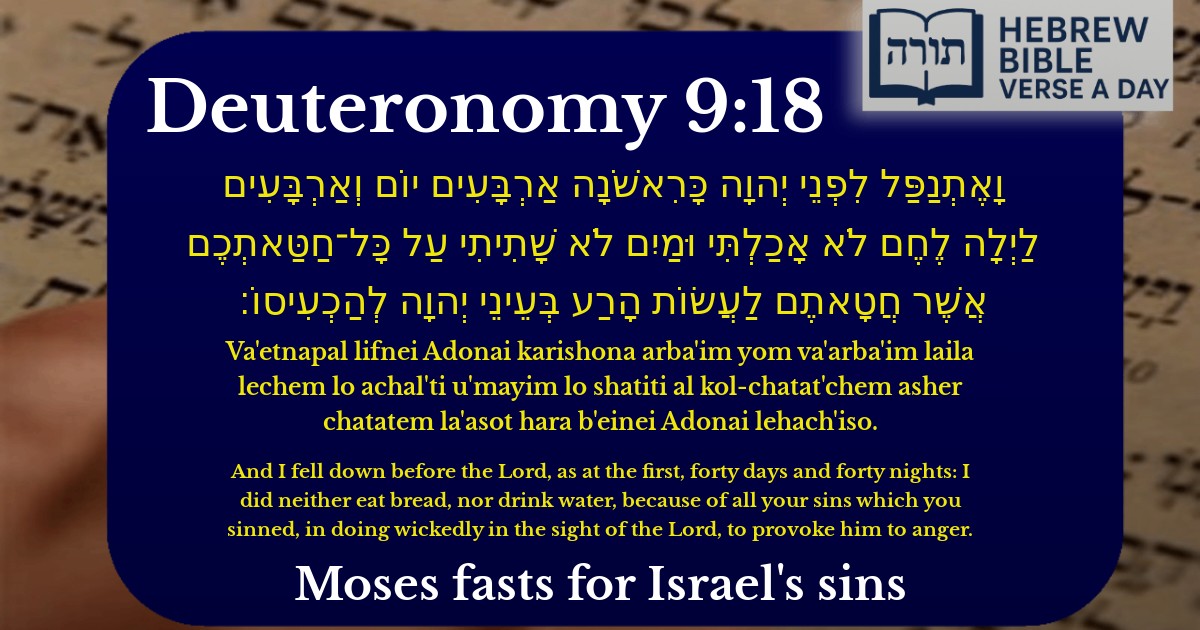Join Our Newsletter To Be Informed When New Videos Are Posted
Join the thousands of fellow Studends who rely on our videos to learn how to read the bible in Hebrew for free!
Hebrew Text
וָאֶתְנַפַּל לִפְנֵי יְהוָה כָּרִאשֹׁנָה אַרְבָּעִים יוֹם וְאַרְבָּעִים לַיְלָה לֶחֶם לֹא אָכַלְתִּי וּמַיִם לֹא שָׁתִיתִי עַל כָּל־חַטַּאתְכֶם אֲשֶׁר חֲטָאתֶם לַעֲשׂוֹת הָרַע בְּעֵינֵי יְהוָה לְהַכְעִיסוֹ׃
English Translation
And I fell down before the Lord, as at the first, forty days and forty nights: I did neither eat bread, nor drink water, because of all your sins which you sinned, in doing wickedly in the sight of the Lord, to provoke him to anger.
Transliteration
Va'etnapal lifnei Adonai karishona arba'im yom va'arba'im laila lechem lo achal'ti u'mayim lo shatiti al kol-chatat'chem asher chatatem la'asot hara b'einei Adonai lehach'iso.
Hebrew Leining Text
וָֽאֶתְנַפַּל֩ לִפְנֵ֨י יְהֹוָ֜ה כָּרִאשֹׁנָ֗ה אַרְבָּעִ֥ים יוֹם֙ וְאַרְבָּעִ֣ים לַ֔יְלָה לֶ֚חֶם לֹ֣א אָכַ֔לְתִּי וּמַ֖יִם לֹ֣א שָׁתִ֑יתִי עַ֤ל כׇּל־חַטַּאתְכֶם֙ אֲשֶׁ֣ר חֲטָאתֶ֔ם לַעֲשׂ֥וֹת הָרַ֛ע בְּעֵינֵ֥י יְהֹוָ֖ה לְהַכְעִיסֽוֹ׃
Parasha Commentary
📚 Talmud Citations
This verse is not quoted in the Talmud.


Context of the Verse
This verse (Devarim 9:18) is part of Moshe Rabbeinu's recounting of the events following the sin of the Golden Calf (עגל הזהב). Moshe describes how he prostrated himself before Hashem for forty days and nights, abstaining from food and water, to plead for the forgiveness of Bnei Yisrael.
Forty Days and Nights
Rashi explains that these forty days correspond to the first set of forty days Moshe spent on Har Sinai receiving the Torah (Shemot 24:18). Just as he abstained from food and drink during that time, he did so again when seeking atonement for the people. The Midrash Tanchuma (Ki Tisa 26) emphasizes that Moshe's complete fasting was a demonstration of his total devotion to the spiritual needs of Klal Yisrael.
Moshe's Self-Sacrifice
The Ramban notes that Moshe's statement "because of all your sins" highlights his role as an intercessor who took the people's sins upon himself. The Talmud (Berachot 32b) derives from this that a leader must be willing to undergo extreme hardships for the sake of the community's spiritual welfare.
The Power of Teshuvah
Lessons in Leadership
The Netziv in Ha'amek Davar explains that Moshe's willingness to suffer for the people demonstrated the ideal of a Jewish leader - one who identifies completely with the nation's struggles and takes responsibility for their spiritual condition. This stands in contrast to the Golden Calf episode where leadership failed the people.